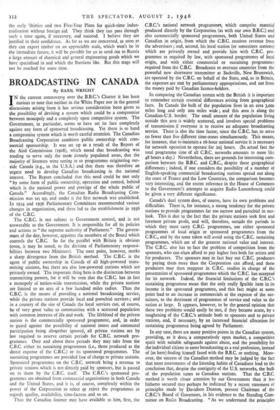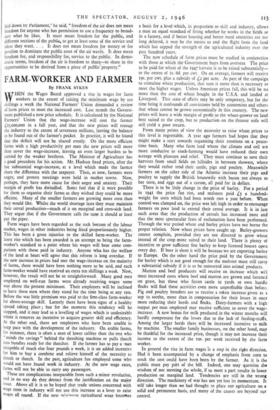BROADCASTING IN CANADA
By BASIL WRIGHT
IN the current controversy over the B.B.C.'s Charter it has been curious to note that neither in the White Paper nor in the general discussions arising from it has serious consideration been given to the possibility of devising a system which could be a compromise between monopoly and a completely open competitive system. The Government, in particular, seems to have set its face completely against any form of sponsored broadcasting. Yet there is to hand a compromise system which is worth careful attention. The Canadian Broadcasting Corporation combines public ownership with com- mercial sponsorship. It was set up as a result of the Report of the Aird Commission (1928), which noted that broadcasting was tending to serve only the mile densely populated areas, that the majority of listeners were tuning in to programmes originating out- side Canada (e.g., in the U.S.A.) and that there was therefore an urgent need to develop Canadian broadcasting in the national interest. The Report concluded that this need could be met only " by some form of public ownership; operation and control, behind which is the national power and prestige of the whole public of Canada." Accordingly, the Canadian Radio Broadcasting Com- mission was set up, and under it the first network was established. In 1934 and 1936 Parliamentary Committees recommended various changes in organisation, and these led to the establishment in 1936 of the C.B.C.
The C.B.C. is not subject to Government control, and is not answerable to the Government. It is responsible for all its policies and actions to "the supreme authority of Parliament." The govern- me,nt of the day, however, appoints the members of the Board which controls the C.B.C. So far the parallel with Britain is obvious (even, it may be noted, to the division of Parliamentary responsi- bilities between two Ministers). The next point, however, marks a sharp divergence from the British method. The C.B.C. is the agent of public ownership in Canada of all high-powered trans- mining stations, but there are also low-powered stations which are privately owned. The important thing here is the distinction between transmitting powers, for it will be seen that the C.B.C. has in fact a monopoly of nation-wide transmission, while the private stations are limited to an area of a few hundred miles radius. Thus the C.B.C. is the means of providing a national broadcasting service, while the private stations provide local and parochial services ; and in a country of the size of Canada the local services can, of course, be of very great value to communities with a scattered population with common interests of life and work. The lifeblood of the private station is the commercially sponsored programme, and, in order to guard against the possibility of national issues and communal participation being altogether ignored, all private stations are by law required to reserve certain periods for C.B.C. network pro- grammes. Over and above these periods they may take from the C.B.C. either its sustaining programmes (i.e., those produced at the direct expense of the C.B.C.) or its sponsored programmes. The sustaining programmes are provided free of charge to private stations. Sponsored programmes on the C.B.C. network bring a revenue to private stations which is not directly paid by sponsors, but is passed on to them by the C.B.C. itself. The C.B.C.'s sponsored pro- grammes are obtained from commercial organisations in both Canada and the United States, and it is, of course, completely within the power of the Corporation to select or reject the programmes as regards quality, availability, time-factors and so on.
Thus the Canadian listener may have available to him, first, the
C.B.C.'s national network programmes, which comprise material produced directly by the Corporation (as with our own B.B.C) and also commercially sponsored programmes, both United States and Canadian in origin, from which the C.B.C. receives revenue from the advertisers ; and, second, his local station (or sometimes stations) which are privately owned and provide him with C.B.C. pro- grammes as required by law, with sponsored programmes of local origin, and with s either commercial or sustaining programmes required from the t./1.C. Broadcasts to overseas countries from the powerful new shortwave transmitter at Sackville, New Brunswick, are operated by the C.B.C. on behalf of the State, and, as in Britain, the expenses are nick by parliamentary appropriations, and not from the money paid by Canadian licence-holders.
In comparing the Canadian system with the British it is important to remember certain essential differences arising from geographical facts. In Canada the bulk of the population lives in an area 3,000 miles long and only 200 miles wide ; and this area is along the Canadian-U.S. border. The crnAll amount of the population living outside this area ii widely scattered, and involves special problems of transmission if everyone is to receive an adequate broadcasting service. There is also the time factor, since the C.B.C. has .to serve no fewer than five different time-zones simultaneously. This means, for instance, that to maintain a i6-hour national service it is necessary for network operation to operate for 204 hours. (In actual fact the total programme time of all C.B.C. networks amounts to more like 48 hours a day.) Nevertheless, there are grounds for interesting com- parison between the B.B.C. and C.B.C., despite these geographical differences ; indeed, if one considers the possibility of a number of English-speaking commercial broadcasting stations spread out along the coast of France ,and the Low Countries, the comparison becomes very interesting, and the recent reference in the House of Commons to the Government's attempts to acquire Radio Luxembourg could be given a very different significance.
Canada's dual system does, of course, have its own problems and difficulties. There is, for instance, a strong tendency for the private stations to provide programmes far too narrow and parochial in out- look. This is due tq, the fact that the private stations seek first and foremost private profit, and will, therefore, outside the periods in which they must carry C.B.C. programmes, use either sponsored programmes of local origin or sponsored programmes from the C.B.C., and by the same token will avoid using the C.B.C. sustaining programmes, which are of the greatest national value and interest. The C.B.C. also has to face the problem of competition from the sponsors, who can often afford to pay higher fees both for artists and for producers. The sponsors may in fact buy out C.B.C. producers by paying them more than the Corporation can afford, and these producers may then reappear in C.B.C. studios in charge of the presentation of sponsored programmes which the C.B.C. has accepted for its network. Indeed, the financial limitations of the C.B.C.'s sustaining programme mean that the only really flexible item in its income is the sponsored programme, and this fact might at some point lead to an increase in commercials at the expense of the sus- tainers, to the detriment of programmes of service and value to the nation at large. It appears, however, to be the general opinion that these two problems would easily be met, if they became acute, by a toughening of the C.B.C.'s attitude both to sponsors and to private stations, and, if necessary, by an increased financial allocation for sustaining programmes being agreed by Parliament.
In any case, there are many positive points in the Canadian system, providing, as it does -a comparatively open market, a competitive spirit with suitable safeguards against abuse, and the possibility for the individual citizen to enter broadcasting as a real profession, instead of (as here) finding himself faced with the B.B.C. or nothing. More- over, the success of the Canadian method may be judged by the fact that most assessments of the listening habits of Canadians lead to the conclusion that, despite the contiguity of the U.S. networks, the bulk of the population tunes to Canadian stations. That the C.B.C. method is worth closer attention by our Government than it has hitherto secured may perhaps be indicated by a recent statement of principles made by 'Davidson Dunton, present Chairman of the C.B.C.'s Board of Governors, in his evidence to the Standing Com- mittee on Radio Broadcasting. " As we understand the principles laid down by Parliament," he said, " freedom of the air does not mean freedom for anyone who has permission to use a frequency to broad- cast what he likes. It must mean freedom for the public, and different sections of the public. to get at least some of the service and ideas they want. . . . It does not mean freedom for money or for position to dominate the public asset of the air wavis. It does mean freedom for, and responsibility for, service to the public.- In demo- cratic terms, freedom of the air is freedom to shars—to share in the opportunities to be derived from a piece of public property."



























 Previous page
Previous page